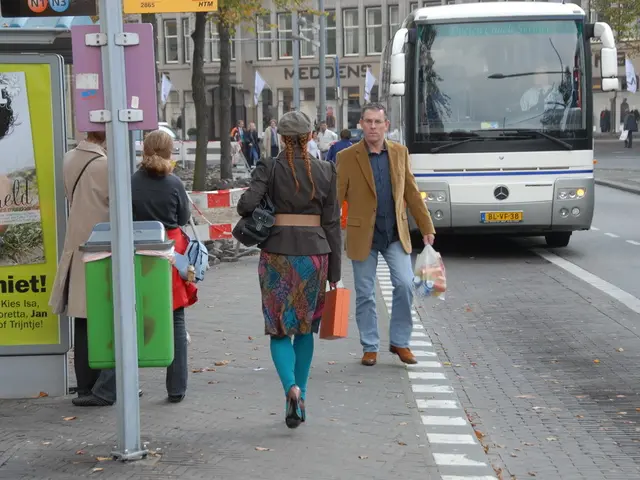Possible Deportation of the Knife Assailant from Würzburg Considered
Würzburg: Four years after a mentally ill refugee fatally stabbed three women, discussions regarding his potential deportation to Somalia are unfolding. Following the crime, the man's protected status was permanently revoked, and an order for his expulsion from the territory of the Federal Republic of Germany was issued by the Bavarian State Office for Asylum and Return.
In the Würzburg city center on June 25, 2021, the man, a Somali in his mid-30s, reportedly stabbed passersby. Several individuals were injured in the attack, and the man's mental illness was confirmed by multiple expert opinions.
Pursuit of Travel Document for Deportation
Without valid papers, the man's deportation faces various prerequisites, the state office explained. These include obtaining a suitable personal document for return, securing a suitable flight connection, and acceptance from Somalia to receive the returning individual. A process to secure a travel document has commenced. Moreover, Somalia generally requires a so-called declaration of willingness to issue "return travel documents."
Indefinite Hospitalization
In July 2022, the Würzburg Regional Court decreed the man should be accommodated in a psychiatric hospital indefinitely. As long as his paranoid schizophrenia persists and he is deemed dangerous, his release is ruled out.
Refusal of Therapy
However, the refugee reportedly refuses to engage with any therapy offers in the psychiatric hospital, according to his defense lawyer. "He remains a danger to the public," Schrepfer informed the German Press Agency. "He is still considered generally dangerous in the hospital where he resides."
Schrepfer anticipates the continuation of the measure during the next court hearing, likely at the end of July. "He is not yet cured. He expresses no interest in therapy offers."
Infrequent Deportations to Somalia
Deportations to Somalia are relatively rare, given the security situation in the East African country. Currently, around 65,000 Somalis live in Germany, among whom only a small number lack the right to stay.
Continued Danger
According to the defense lawyer, deporting the Somali does not alleviate his dangerousness - even for the citizens of his home country. He poses a potential threat. "It's not as if the Somali population would be safe from him," Schrepfer stated.
Moreover, it is possible that the man could return to Germany. "I have clients who illegally cross borders multiple times," Schrepfer noted. "Obviously, there is no security."
The refugee, according to his own account, entered Germany from Italy in May 2015. Though his asylum application was rejected in 2016, he was granted subsidiary protection and thus legally present in Germany at the time of the offense.
Last year, according to the Federal Ministry of the Interior, twelve people were deported from Germany to Somalia.
A spokesperson for the Federal Office for Migration and Refugees commented: "After a deportation from the federal territory, those subject to deportation are registered in the Schengen Information System (SIS) for entry and residence refusal throughout Europe." "This registration employs biometric data and enables migration and police authorities to prevent re-entry," it was added.
- The ongoing discussions about the mentally ill refugee's potential deportation to Somalia are not limited to crime-and-justice matters, as his case also involves aspects of health-and-wellness, mental-health, and general-news, given his refusal of therapy and indefinite hospitalization.
- The federal government's efforts to secure a travel document for the deportation of the Somali refugee are not merely administrative procedures, but are influenced by multiple factors, such as securing a suitable flight connection, obtaining a personal document for return, and receiving acceptance from Somalia, as revealed in the pursuit of travel document for deportation.
- The Somali refugee's continued presence in Germany raises concerns beyond the immediate crime he committed, as his potential threat extends beyond the German population, hinting at potential issues in health-and-wellness, mental-health, general-news, and crime-and-justice realms, as stated by his defense lawyer.








